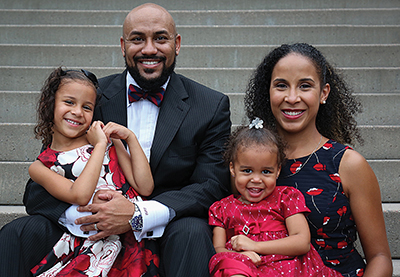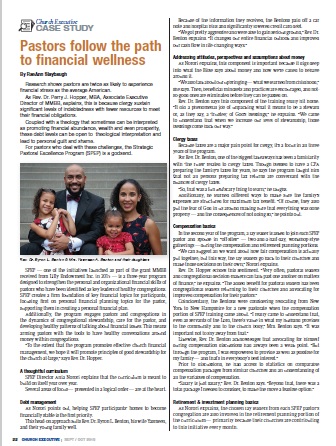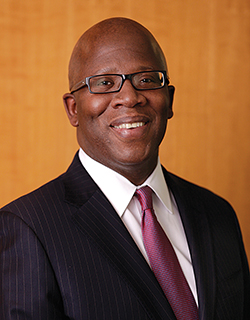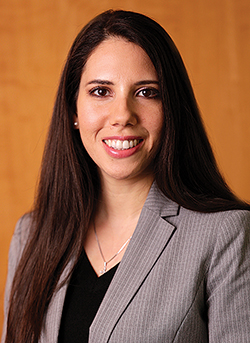By RaeAnn Slaybaugh
 Research shows pastors are twice as likely to experience financial stress as the average American.
Research shows pastors are twice as likely to experience financial stress as the average American.
As Rev. Dr. Perry J. Hopper, MBA, Associate Executive Director of MMBB, explains, this is because clergy sustain significant levels of indebtedness with fewer resources to meet their financial obligations.
Coupled with a theology that sometimes can be interpreted as promoting financial abundance, wealth and even prosperity, these debt levels can be open to theological interpretation and lead to personal guilt and shame.
For pastors who deal with these challenges, the Strategic Pastoral Excellence Program (SPEP) is a godsend.
SPEP — one of the initiatives launched as part of the grant MMBB received from Lilly Endowment Inc. in 2015 — is a three-year program designed to strengthen the personal and organizational financial skills of pastors who have been identified as key leaders of healthy congregations. SPEP creates a firm foundation of key financial topics for participants, focusing first on personal financial planning topics for the pastor, supporting them in creating a personal financial plan.
Additionally, the program engages pastors and congregations in the dynamics of congregational stewardship, care for the pastor, and developing healthy patterns of talking about financial issues. This means arming pastors with the tools to have healthy conversations around money within congregations.
“To the extent that the program promotes effective church financial management, we hope it will promote principles of good stewardship for the church-at-large,” says Rev. Dr. Hopper.

A thoughtful curriculum
SPEP Director Ania Norori explains that the curriculum is meant to build on itself year over year.
Several areas of focus — presented in a logical order — are at the heart.
Debt management
As Norori points out, helping SPEP participants’ homes to become financially stable is the first priority.
This head-on approach suits Rev. Dr. Byron L. Benton, his wife Yasmeen, and their young family well.
Because of the information they received, the Bentons paid off a car note and hospital bills and significantly lowered credit card debt.
“We got pretty aggressive and were able to gain serious ground,” Rev. Dr. Benton explains. “It changed our entire financial outlook and improved our cash flow in life-changing ways.”
Addressing attitudes, perspectives and assumptions about money
As Norori explains, this component is important because it digs deep into what the Bible says about money and how we’re called to behave around it.

“We also talk about our upbringing — what we learned from childhood,” she says. Then, beneficial mindsets and practices are encouraged, and not-so-good ones are eliminated before they can be passed on.
Rev. Dr. Benton says this component of the training really hit home. “It did a phenomenal job of unpacking what it means to be a steward or, as they say, a ‘trustee,’ of God’s blessings,” he explains. “We came to understand that when we increase our level of stewardship, those blessings come back our way.”
Clergy taxes
Because taxes are a major pain point for clergy, it’s a focus in all three years of the program.
For Rev. Dr. Benton, one of the biggest takeaways has been a familiarity with ‘the rules’ related to clergy taxes. Though blessed to have a CPA preparing the family’s taxes for years, he says the program taught him that not all persons preparing tax returns are conversant with the nuances of clergy taxes.
“So, that was a fun and scary thing to learn,” he laughs.
Additionally, he learned different ways to make sure the family’s expenses are structured for maximum tax benefit. “Of course, they also put the fear of God in us around making sure that everything was done properly — and the consequences of not doing so,” he points out.
Compensation basics
In the second year of the program, a lay leader is asked to join each SPEP pastor and spouse in “off-sites” — two-and-a-half-day, workshop-style gatherings — during the compensation and retirement planning portions.
“It changed our entire financial outlook and improved our cash flow in life-changing ways.”
— Rev. Dr. Byron L. Benton
“We can suggest all we want about how fair compensation is actually put together; but this way, the lay leaders go back to their churches and make those decisions on their own,” Norori explains.
Rev. Dr. Hopper echoes this sentiment. “Very often, pastoral leaders and congregational decision-makers can talk past one another on matters of finance,” he explains. “The added benefit for pastoral leaders has been congregational leaders returning to their churches and advocating for improved compensation for their pastors.”
Coincidentally, the Bentons were considering relocating from New York to New Hampshire for a new pastorate when the compensation portion of SPEP training came about. “I really came to understand that, even as servants of the Lord, there’s value in what my husband provides to the community and to the church body,” Mrs. Benton says. “It was important not to shy away from that.”
Likewise, Rev. Dr. Benton acknowledges that advocating for himself during compensation discussions had always been a weak point. “But through the program, I was empowered to provide as well as possible for my family — and that’s in everybody’s best interest.”
Prior to discussions, he had access to statistics on comparable compensation packages from similar churches and an understanding of all the variables of compensation.
“Salary is just salary,” Rev. Dr. Benton says. “Beyond that, there was a total package I needed to consider, to make the move a feasible option.”
Retirement & investment planning basics
As Norori explains, the chosen lay leaders from each SPEP pastor’s congregation are also involved in the retirement planning portion of the curriculum — primarily because their churches are contributing to this initiative every month.
“We want to make sure they know that it’s preparation for their pastor’s well-being after retirement,” she explains. “Additionally, there’s a risk management component for the church to consider.”
By this, she’s referring to disability benefits provided in the comprehensive retirement plan in which all SPEP pastors are required to be enrolled. In the short term, disability benefits may be provided through the Comprehensive Plan in the event the pastor is unable to work due to an illness or disability; should the pastor suffer an untimely death, the beneficiary may receive payment from a group life insurance policy.
Investment planning goes hand in hand with retirement planning, as SPEP places a priority on teaching pastors the basics, since their retirement accounts are vested.
“We want them to know that they can log into their accounts and look at asset allocation — stocks versus bonds, ratios and so on,” Norori says. “They should feel comfortable and confident in the actual knowledge of their investment positions.”

Associate Executive Director
MMBB
Church financial management
Once SPEP pastors’ own financial houses are in order, it’s their churches’ turn.
In the third year of the program, the church financial management portion incorporates all the previous curriculum aspects, but on a much larger scale.
“The aim is for financially well pastors to be able to communicate and share their knowledge,” Norori explains. “It’s basically a progression from the individual to the community.”
For this phase of the curriculum, a lay leader is, again, invited to join. According to Mrs. Benton, that has been extremely helpful.
“It’s one thing for a pastor to take financial management information back to the church,” she says. “It’s another when a lay leader — in our case, the treasurer — hears it firsthand and passes it on to the rest of the staff and to the trustees. Then, those changes become a big deal.”
Estate planning basics

Director
Strategic Pastoral Excellence Program
This phase of the SPEP curriculum covers wills, power of attorney, do-not-resuscitates (DNRs), trusts and more — “all the things we don’t really think about from day to day,” Norori says.
Prior to SPEP, the Bentons were ahead of the game when it comes to estate planning. They already had a living will, a trust in place, and trustees identified.
Even so, Rev. Dr. Benton says he learned quite a bit: “You realize you’re not as literate as you thought.”
Spousal buy-in is key
SPEP pastors are expected to participate in an annual cohort retreat, including spouses (to the best of their ability). As Rev. Dr. Hopper explains, this is because conversations around money — and the understanding of financial principles — are important for the whole family.
“Transparency is important to the goals of our program,” he says. “We encourage an environment of ‘safe-space’ and ‘no-judgement.’”
Mrs. Benton recalls her husband’s excitement at all he learned in SPEP the first year. “It piqued my interest,” she recalls. “I wanted to engage more, but I was one to shy away from anything to do with finances.”
After attending the second year of the SPEP program, Mrs. Benton says she was able to make a real connection with the private financial conversations between she and her husband. “It has also given me a greater understanding of church-wise impact,” she adds.
Learning from each other
For all SPEP pastors, regular contact with the pastoral cohort is facilitated electronically by the program director. For Rev. Dr. Benton, this practice has fostered accountability.
“It’s just human nature; when you’re expected to give an update on where things are and how you’re doing, it motivates you,” he explains.
Additionally, this interaction has become a place of testimony. “All of us have been processing the same information, so we’re a family,” Rev. Dr. Benton says. “Now we’ve been talking about how to continue our cohort model once SPEP is over.”
Program expectations
As a sign of financial stewardship, SPEP pastors’ congregations are expected to enroll their pastors in MMBB’s Comprehensive Retirement Plan. For the three-year course of this program, MMBB underwrites the plan premiums through funds available from the Lilly Endowment grant, 50 percent of the Plan Premium in year one, 40 percent in year two, and 25 percent in the final year.
As Rev. Dr. Hopper explains, MMBB’s commitment to sharing the cost reflects its belief in taking a holistic approach in recognizing that clergy financial well-being impacts families, the local church, and the larger community. Participation is meant to communicate to the congregation that these benefit protections are important for the pastoral leader, and also for protecting the church in the event of his or her unforeseen disability or death.
For Rev. Dr. Benton and his congregations who were already members of the Comprehensive Retirement Plan, these financial resources were reallocated to provide other staff members with benefits.
Out-of-office
SPEP pastors and their congregations must commit to full engagement in the program for the course of three years, including attending annual offsite meetings, and making time in the pastor’s schedule for regular participation in cohort activities.
Rather than hesitation, Rev. Dr. Benton, says his congregations’ reactions have only been positive.
“They were excited about the information I was getting and the experience, because I would come back and share it all,” he says.
Importantly, all costs associated with travel for cohort meetings are paid for by SPEP. According to Rev. Dr. Hopper, this is because MMBB assumes these costs as an investment in SPEP participants, with the goal of a long-term benefit of their education in the area of clergy finance and church financial management.
“SPEP program participants are amazed to have MMBB stand alongside them in covering the cost of the program,” Rev. Dr. Hopper adds. “This gesture demonstrates our passion for our work as a ministry.”
Inquiries regarding SPEP may be directed to Ania Norori, program director, at ania.norori@mmbb.org.



Found your article interesting to read. This article is really interesting and effective. Expecting more articles from you.